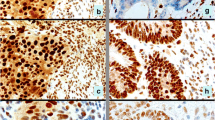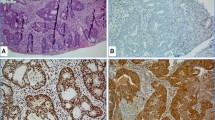Abstract
Hereditary nonpolyposis colorectal cancer (HNPCC) accounts for most hereditary colorectal cancers. The detection of families with HNPCC enables disease surveillance and clinical management, which significantly reduce morbidity and mortality. Mutations in DNA mismatch repair (MMR) genes underlie HNPCC and cause microsatellite instability (MSI). Although screening for pathogenic mutations in DNA MMR genes is time consuming and costly, MSI-based molecular diagnosis improves HNPCC diagnosis, which was once based on clinical characteristics and family history alone. Patients selected for MSI testing usually fulfill the Bethesda criteria. Tumor MSI status with tissue immunohistochemistry staining directs further genetic evaluation, including sequencing of MMR genes or methylation studies. This review outlines the importance of MSI status in disease diagnosis, prognosis, and treatment.
Similar content being viewed by others
References and Recommended Reading
Jemal A, Thomas A, Murray T, Thun M: Cancer statistics, 2002. CA Cancer J Clin 2002, 52:23–47. [Published erratum appears in CA Cancer J Clin 2002, 52:119, CA Cancer J Clin 2002, 52:181–182.]
Lynch HT, Lynch PM: Molecular screening for the Lynch syndrome-better than family history? N Engl J Med 2005, 352:1920–1922.
Lynch HT, Ens J, Lynch JF, Watson P: Tumor variation in three extended Lynch syndrome II kindreds. Am J Gastroenterol 1988, 83:741–747.
Vasen HF, Watson P, Mecklin JP, Lynch HT: New clinical criteria for hereditary nonpolyposis colorectal cancer (HNPCC, Lynch syndrome) proposed by the International Collaborative group on HNPCC. Gastroenterology 1999, 116:1453–1456.
Cunningham JM, Kim CY, Christensen ER, et al.: The frequency of hereditary defective mismatch repair in a prospective series of unselected colorectal carcinomas. Am J Hum Genet 2001, 69:780–790.
Caldes T, Godino J, Sanchez A, et al.: Immunohistochemistry and microsatellite instability testing for selecting MLH1, MSH2 and MSH6 mutation carriers in hereditary non-polyposis colorectal cancer. Oncol Rep 2004, 12:621–629.
Lin KM, Shashidharan M, Ternent CA, et al.: Colorectal and extracolonic cancer variations in MLH1/MSH2 hereditary nonpolyposis colorectal cancer kindreds and the general population. Dis Colon Rectum 1998, 41:428–433.
Alexander J, Watanabe T, Wu TT, et al.: Histopathological identification of colon cancer with microsatellite instability. Am J Pathol 2001, 158:527–535.
Lynch HT, de la Chapelle A: Genetic susceptibility to non-polyposis colorectal cancer. J Med Genet 1999, 36:801–818.
Vasen HF, Mecklin JP, Khan PM, Lynch HT: The International Collaborative Group on Hereditary Non-Polyposis Colorectal Cancer (ICG-HNPCC). Dis Colon Rectum 1991, 34:424–425.
Salovaara R, Loukola A, Kristo P, et al.: Population-based molecular detection of hereditary nonpolyposis colorectal cancer. J Clin Oncol 2000, 18:2193–2200.
Lindor NM, Rabe K, Petersen GM, et al.: Lower cancer incidence in Amsterdam-I criteria families without mismatch repair deficiency: familial colorectal cancer type X. JAMA 2005, 293:1979–1985.
Rodriguez-Bigas MA, Boland CR, Hamilton SR, et al.: A National Cancer Institute Workshop on Hereditary Nonpolyposis Colorectal Cancer Syndrome: meeting highlights and Bethesda guidelines. J Natl Cancer Inst 1997, 89:1758–1762.
Terdiman JP, Gum JR Jr, Conrad PG, et al.: Efficient detection of hereditary nonpolyposis colorectal cancer gene carriers by screening for tumor microsatellite instability before germline genetic testing. Gastroenterology 2001, 120:21–30.
Jarvinen HJ, Aarnio M, Mustonen H, et al.: Controlled 15-year trial on screening for colorectal cancer in families with hereditary nonpolyposis colorectal cancer. Gastroenterology 2000, 118:829–834.
Ramsey SD, Clarke L, Etzioni R, et al.: Cost-effectiveness of microsatellite instability screening as a method for detecting hereditary nonpolyposis colorectal cancer. Ann Intern Med 2001, 135(8 Pt 1):577–588.
de la Chapelle A: Microsatellite instability. N Engl J Med 2003, 349:209–210.
Boland CR: Clinical uses of microsatellite instability testing in colorectal cancer: an ongoing challenge. J Clin Oncol 2007, 25:754–756.
Cunningham JM, Christensen ER, Tester DJ, et al.: Hypermethylation of the hMLH1 promoter in colon cancer with microsatellite instability. Cancer Res 1998, 58:3455–3460.
Gryfe R, Kim H, Hsieh ET, et al.: Tumor microsatellite instability and clinical outcome in young patients with colorectal cancer. N Engl J Med 2000, 342:69–77.
Nagasaka T, Koi M, Kloor M, et al.: Mutations in both KRAS and BRAF may contribute to the methylator phenotype in colon cancer. Gastroenterology 2008, 134:1950–1960.
Boland CR, Thibodeau SN, Hamilton SR, et al.: A National Cancer Institute Workshop on Microsatellite Instability for cancer detection and familial predisposition: development of international criteria for the determination of microsatellite instability in colorectal cancer. Cancer Res 1998, 58:5248–5257.
Dietmaier W, Wallinger S, Bocker T, et al.: Diagnostic microsatellite instability: definition and correlation with mismatch repair protein expression. Cancer Res 1997, 57:4749–4756.
Graham T, Halford S, Page KM, Tomlinson IP: Most lowlevel microsatellite instability in colorectal cancers can be explained without an elevated slippage rate. J Pathol 2008, 215:204–210.
Zhou XP, Hoang JM, Li YJ, et al.: Determination of the replication error phenotype in human tumors without the requirement for matching normal DNA by analysis of mononucleotide repeat microsatellites. Genes Chromosomes Cancer 1998, 21:101–107.
Suraweera N, Duval A, Reperant M, et al.: Evaluation of tumor microsatellite instability using five quasimonomorphic mononucleotide repeats and pentaplex PCR. Gastroenterology 2002, 123:1804–1811.
Mead LJ, Jenkins MA, Young J, et al.: Microsatellite instability markers for identifying early-onset colorectal cancers caused by germ-line mutations in DNA mismatch repair genes. Clin Cancer Res 2007, 13:2865–2869.
Urso E, Pucciarelli S, Agostini M, et al.: Proximal colon cancer in patients aged 51-60 years of age should be tested for microsatellites instability. A comment on the Revised Bethesda Guidelines. Int J Colorectal Dis 2008, 23:801–806.
Ferreira S, Claro I, Lage P, et al.: Colorectal adenomas in young patients: microsatellite instability is not a useful marker to detect new cases of Lynch syndrome. Dis Colon Rectum 2008, 51:909–915.
Lindor NM, Burgart LJ, Leontovich O, et al.: Immunohistochemistry versus microsatellite instability testing in phenotyping colorectal tumors. J Clin Oncol 2002, 20:1043–1048.
Truta B, Chen YY, Blanco AM, et al.: Tumor histology helps to identify Lynch syndrome among colorectal cancer patients. Fam Cancer 2008, 7:267–274.
Balmana J, Stockwell DH, Steyerberg EW, et al.: Prediction of MLH1 and MSH2 mutations in Lynch syndrome. JAMA 2006, 296:1469–1478.
Barnetson RA, Tenesa A, Farrington SM, et al.: Identification and survival of carriers of mutations in DNA mismatch-repair genes in colon cancer. N Engl J Med 2006, 354:2751–2763.
Chen S, Wang W, Lee S, et al.: Prediction of germline mutations and cancer risk in the Lynch syndrome. JAMA 2006, 296:1479–1487.
Jenkins MA, Hayashi S, O’shea AM, et al.: Pathology features in Bethesda guidelines predict colorectal cancer microsatellite instability: a population-based study. Gastroenterology 2007, 133:48–56.
Hampel H, Frankel WL, Martin E, et al.: Screening for the Lynch syndrome (hereditary nonpolyposis colorectal cancer). N Engl J Med 2005, 352:1851–1860.
Southey MC, Jenkins MA, Mead L, et al.: Use of molecular tumor characteristics to prioritize mismatch repair gene testing in early-onset colorectal cancer. J Clin Oncol 2005, 23:6524–6532.
Cawkwell L, Gray S, Murgatroyd H, et al.: Choice of management strategy for colorectal cancer based on a diagnostic immunohistochemical test for defective mismatch repair. Gut 1999, 45:409–415.
Debniak T, Kurzawski G, Gorski B, et al.: Value of pedigree/ clinical data, immunohistochemistry and microsatellite instability analyses in reducing the cost of determining hMLH1 and hMSH2 gene mutations in patients with colorectal cancer. Eur J Cancer 2000, 36:49–54.
International Society for Gastrointestinal Hereditary Tumours. Available at http://www.insight-group.org. Accessed October 2008.
Vasen HF, Stormorken A, Menko FH, et al.: MSH2 mutation carriers are at higher risk of cancer than MLH1 mutation carriers: a study of hereditary nonpolyposis colorectal cancer families. J Clin Oncol 2001, 19:4074–4080.
Geary J, Thomas HJ, Mackay J, et al.: The management of families affected by hereditary non-polyposis colorectal cancer (HNPCC). Fam Cancer 2007, 6:13–19.
Gill S, Lindor NM, Burgart LJ, et al.: Isolated loss of PMS2 expression in colorectal cancers: frequency, patient age, and familial aggregation. Clin Cancer Res 2005, 11:6466–6471.
Lipkin SM, Rozek LS, Rennert G, et al.: The MLH1 D132H variant is associated with susceptibility to sporadic colorectal cancer. Nat Genet 2004, 36:694–699.
Shin BY, Chen H, Rozek LS, et al.: Low allele frequency of MLH1 D132H in American colorectal and endometrial cancer patients. Dis Colon Rectum 2005, 48:1723–1727.
Potocnik U, Glavac D, Dean M: Common germline MDR1/ ABCB1 functional polymorphisms and haplotypes modify susceptibility to colorectal cancers with high microsatellite instability. Cancer Genet Cytogenet 2008, 183:28–34.
Campbell PT, Curtin K, Ulrich C, et al.: Mismatch repair polymorphisms and risk of colon cancer, tumor microsatellite instability, and interactions with lifestyle factors. Gut 2008, [Epub ahead of print].
Benatti P, Gafa R, Barana D, et al.: Microsatellite instability and colorectal cancer prognosis. Clin Cancer Res 2005, 11:8332–8340. [Published erratum appears in Clin Cancer Res 2006, 12:3868–3869.]
Popat S, Hubner R, Houlston RS: Systematic review of microsatellite instability and colorectal cancer prognosis. J Clin Oncol 2005, 23:609–618.
Carethers JM, Chauhan DP, Fink D, et al.: Mismatch repair proficiency and in vitro response to 5-fluorouracil. Gastroenterology 1999, 117:123–131.
Carethers JM, Smith EJ, Behling CA, et al.: Use of 5-fluorouracil and survival in patients with microsatellite-unstable colorectal cancer. Gastroenterology 2004, 126:394–401.
Jover R, Zapater P, Castells A, et al.: Mismatch repair status in the prediction of benefit from adjuvant fluorouracil chemotherapy in colorectal cancer. Gut 2006, 55:848–855.
Muller CI, Schulmann K, Reinacher-Schick A, et al.: Predictive and prognostic value of microsatellite instability in patients with advanced colorectal cancer treated with a fluoropyrimidine and oxaliplatin containing first-line chemotherapy. A report of the AIO Colorectal Study Group. Int J Colorectal Dis 2008, [Epub ahead of print].
Watanabe T, Wu TT, Catalano PJ, et al.: Molecular predictors of survival after adjuvant chemotherapy for colon cancer. N Engl J Med 2001, 344:1196–1206.
Malesci A, Laghi L, Bianchi P, et al.: Reduced likelihood of metastases in patients with microsatellite-unstable colorectal cancer. Clin Cancer Res 2007, 13:3831–3839.
Watanabe T, Kobunai T, Toda E, et al.: Distal colorectal cancers with microsatellite instability (MSI) display distinct gene expression profiles that are different from proximal MSI cancers. Cancer Res 2006, 66:9804–9808.
Author information
Authors and Affiliations
Corresponding author
Rights and permissions
About this article
Cite this article
Rosner, G., Strul, H. Microsatellite instability in the evaluation of hereditary nonpolyposis colorectal cancer. Curr colorectal cancer rep 5, 40–47 (2009). https://doi.org/10.1007/s11888-009-0007-8
Published:
Issue Date:
DOI: https://doi.org/10.1007/s11888-009-0007-8




